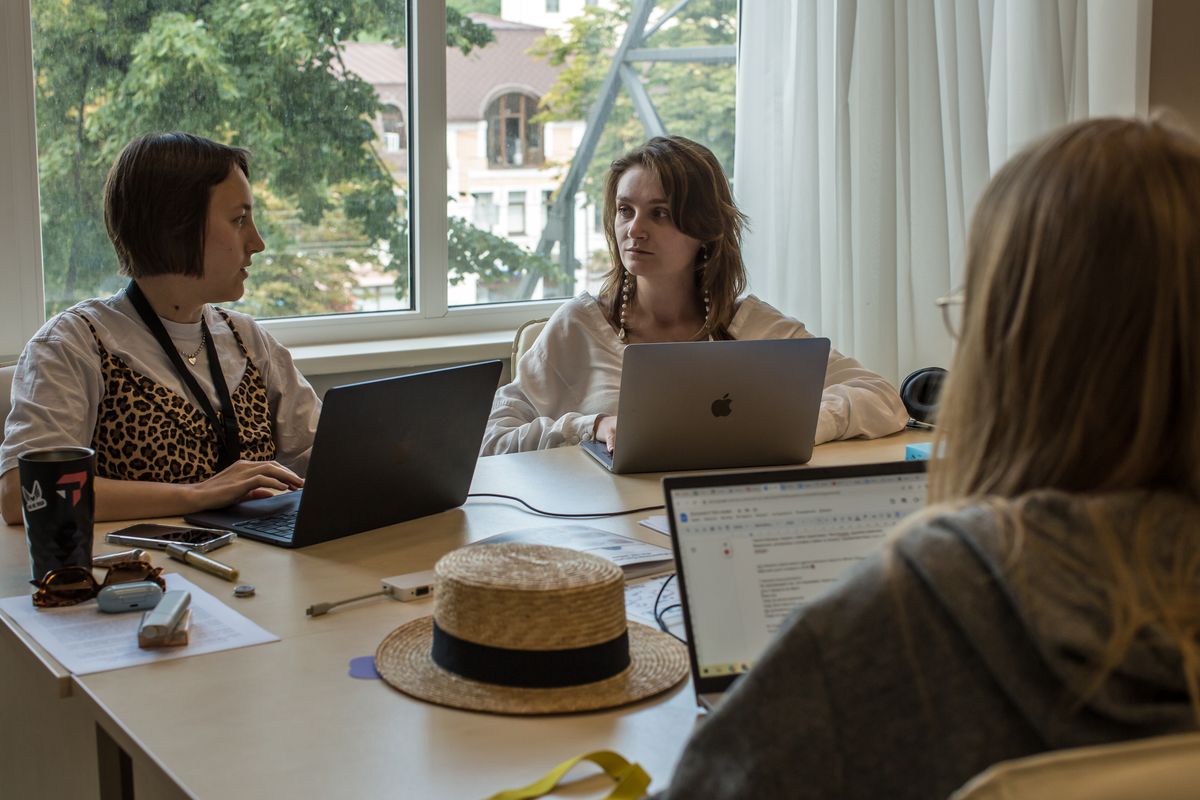Trump foreign aid cuts leave Ukrainians in limbo and asking why
Ivona Kostyna, a co-founder of Ukraine’s Veteran Hub, which had to abruptly shut down a hotline for distressed Ukrainian troops, veterans and their families over the weekend. (Oksana Parafeniuk for The Washington Post)
KYIV, Ukraine – For nearly three years, distressed Ukrainian troops, veterans and their families – including some on the brink of suicide – have relied on a U.S.-funded hotline to connect with trained psychological, legal and medical experts.
But after President Donald Trump signed an executive order last week suspending almost all U.S. foreign aid programs for 90 days, the line went dark.
“The support line is temporarily unavailable,” a recorded voice now tells callers. “The Veteran Hub thanks you for your trust. The consultants will return to work as soon as it becomes possible.”
The Trump administration’s sudden move to suspend foreign aid has thrust many countries into uncertainty as they assess how to proceed without the funding that has kept key social programs running for years. For Ukraine, the situation feels especially precarious, with the cuts raising questions about the future of everything from humanitarian aid supporting those most affected by Russia’s invasion to whether Washington will continue military funding.
A congressional aide familiar with the matter said the order appeared to halt U.S. foreign military financing to Ukraine as well as direct bilateral economic assistance. The aide spoke on the condition of anonymity due to the sensitivity of the matter.
In addition to State Department-issued funding that supported Ukrainian organizations such as Veteran Hub, which ran the now-shuttered help line, the suspension affects funding for U.S. Agency for International Development programs. Only global food assistance programs and operations in Israel and Egypt are unaffected.
USAID has sent more than $7.6 billion in humanitarian and development aid to Ukraine since Russia invaded in February 2022, and another $30 billion of direct budget support. A Ukrainian official, also speaking on the condition of anonymity due to the sensitivity of the situation, maintained that the suspension did not affect direct U.S. budget assistance, which fills key gaps including paying for public servants’ salaries that keep the country running despite the war.
But many other programs, ranging from support for humanitarian aid and energy assistance to news outlets and anti-corruption initiatives, have been halted. Assessing the full scale of repercussions is complicated by the fact that many affected organizations are declining to speak publicly, citing fears that they could face repercussions during the review process if they are perceived as having criticized the Trump administration. The White House has suspended dozens of career officials from USAID amid accusations they are trying to “circumvent” Trump’s order.
One person affiliated with USAID-supported programs in Ukraine said American funds have helped protect U.S. interests in the country, including through anti-corruption efforts.
“USAID has done a lot of good things here, especially during the war – things like securing energy for communities that suffered because of Russian attacks, humanitarian work, school support, especially building shelters in schools,” the person said, speaking on the condition of anonymity over fears of possible retaliation for criticizing the order. “My concern is that the current administration probably does not care as much about this humanitarian side of things.”
Veteran Hub, which works with thousands of veterans across Ukraine, has posted across social media pleading for donations to keep its programs running despite the U.S. pause. The group said it was ordered to halt work on Saturday, and the suspension has cut roughly two-thirds of its funding. Many of Veteran Hub’s employees are relatives of troops who are fighting or have been killed or wounded on the front line.
Ivona Kostyna, 28, a co-founder of the group, said she felt they had no choice but to publicly beg for funds because of the huge number of Ukrainian families who rely on their support daily.
The group typically runs two facilities, one in Kyiv and one in the central city of Vinnytsia, the latter of which serves some 700 people per month. In addition to medical and legal support, Veteran Hub runs other programs that help veterans demobilize, reintegrate and seek civilian employment. But the sudden cuts forced the group to close the Vinnytsia location until further notice and completely halt the support line that has served some of the country’s neediest veterans in recent years.
“It has affected our ability to work with the veterans and family members to the core,” Kostyna said. “The largest problem is not the absence of U.S. funding but the sudden and abrupt nature (of the cuts). … With no prior warning, in one day we had to fire 30 people.”
Her staff will not be able to afford to wait 90 days to find out whether their jobs will be restored, she said. To pause for three months “is to lose everything – it’s a complete brain drain of the organization’s people.”
Valeriia Netrebchuk, 29, coordinator for the shuttered support line, which operated daily from 9 a.m. to 9 p.m., said the person who answers the phone is often the first recipient of the caller’s grief or anger after they learn devastating news that loved ones have been killed or wounded on the front.
“Sometimes we receive phone calls because people have suicidal thoughts – they have trouble turning back to civilian life, to peaceful life because they have contact with civilians who don’t have the same traumatic experience they had in the army,” she said.
“We have a lot of conversations where people are calling us and they have this sharp grief,” she added. “They just don’t know what to do with that and they just express those emotions.”
Serhii Columbet, 32, is one of the thousands of Ukrainian veterans who has sought support from Veteran Hub. Last year, a Russian tank shell tore off his right leg in eastern Ukraine.
After the rest of his leg was amputated, he was moved to a hospital in Vinnytsia, where Veteran Hub employees asked him if he needed help. Traumatized by his injury and fearful over his future, he sought psychological and legal support through the group. He described how, for the first time after his injury, he felt understood.
He is stunned that Trump’s move has forced a veteran support group to close. “We are protecting our land and if you are sanctioning someone, you should sanction the aggressor – not the people who are protecting themselves, and especially not veterans.”
Veniamin, 28, a wounded Ukrainian soldier who spoke on condition that he be identified only by his first name, was wounded twice by Russian mines on the front line in 2022 and 2023 and has since had more than 20 surgeries.
He is recovering in Vinnytsia, where he relied on Veteran Hub to form a community of wounded soldiers, seek purpose and avoid the social isolation that has been destroying Ukrainian families since the war began.
Throughout his time on the front line, he said, he wore an American flag patch on his uniform. He doesn’t understand why Washington would cut programs that support people like him.
“When Trump was elected, I looked for an opportunity to write him a letter,” he said. “I understand that there are a significant number of Americans who are biased against Ukrainians. We simple Ukrainians have a very friendly attitude toward the USA, but for some reason, not all in the USA feel the same toward us.”

